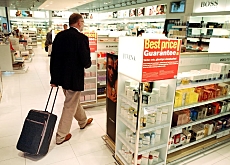
Government set to review duty-free rules

Passengers landing at Swiss airports could soon be able to buy duty-free products on arrival, following intense lobbying by airports and pressure groups.
The government, which rejected similar calls for a change to the customs law two years ago, is due to decide on the issue later this month.
Undaunted by their previous setback, those in favour of introducing “arrival duty-free” in Switzerland believe they have a better chance second time around.
Lobbying by Aerosuisse, the airline industry’s umbrella organisation, and the Swiss International Airports Association (SIAA) has focused on recent hand-luggage restrictions, the inconvenience of carrying products on board aircraft, environmental benefits and increased revenue.
“One of the main reasons is that it would generate increased earnings and jobs. The revenues could be used to reduce the pressure to increase airport fees, which currently have an upward tendency due to security costs,” Paul Kurrus, chairman of Aerosuisse, told swissinfo.
According to parliamentarian Hans Kaufmann, duty-free on arrival would create up to 80 new jobs at six airports – Zurich, Geneva, Basel, Bern, Lugano and St Gallen – and would lead to increased revenue of SFr20-23 million ($16-18 million) a year.
Security scare
Kurrus said last month’s security alert at London’s Heathrow airport, which prompted a temporary ban on liquids and gels being carried in hand luggage, was another factor.
He said the European Union had yet to decide on what concrete measures to take but he warned that further restrictions on carrying liquids and gels were likely.
The International Civil Aviation Organization announced on Wednesday that it would publish a new list of prohibited carry-on items by the end of November.
It said this would take account of the new threat posed by liquid, gel and aerosol products that could be used in improvised explosive devices.
Aerosuisse also claims there are credible environmental reasons for leaving duty-free products on the ground. According to its estimates, it takes 100 litres of kerosene to transport a bottle of champagne over a year.
“There is a hell of a lot of energy used just to transport these goods unnecessarily. The impact on the environment has been totally underestimated,” said Kurrus.
Norwegian model
Kaufmann, who raised the issue in parliament in May, said the introduction of duty-free on arrival at Oslo airport in Norway in 2005 had proved a resounding success.
According to the rightwing Swiss People’s Party parliamentarian, 19 destinations now offer such a service – 11 of them in Europe.
The Swiss International Airports Association, whose members include Basel, Bern, Geneva, Lugano and Zurich airports, has also been campaigning hard for a change in the law.
“Our main aim is to ensure passengers can travel in greater comfort, so they no longer have to carry duty-free goods onto flights,” said Philip Roy, spokesman for Geneva airport. “But this could also be a source of additional revenue and jobs for airports.”
Roy, who said the lead set by Norway augured well for a positive response from the government, estimated that 20 additional jobs could be created at Geneva airport.
The Federal Chancellery was unable to confirm to swissinfo whether the cabinet would discuss the duty-free question on September 29, saying the agenda was confidential. The finance ministry declined to comment ahead of the meeting.
swissinfo, Adam Beaumont
A previous attempt to introduce “arrival duty-free” in Switzerland in 2004 was rejected by the government.
Ministers said such a move would breach a European customs agreement, do little to reduce tobacco consumption, have a negligible effect on CO2 emissions and lead to a loss of customs duty.

In compliance with the JTI standards
More: SWI swissinfo.ch certified by the Journalism Trust Initiative


























You can find an overview of ongoing debates with our journalists here . Please join us!
If you want to start a conversation about a topic raised in this article or want to report factual errors, email us at english@swissinfo.ch.